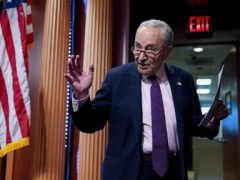WASHINGTON — The Senate is expected to grind through a rare weekend session as Republicans race to pass President Donald Trump’s package of tax breaks and spending cuts by his July Fourth deadline.
Republicans are using their majorities in Congress to push aside Democratic opposition, but they have run into a series of political and policy setbacks. Not all GOP lawmakers are on board with proposals to reduce spending on Medicaid, food stamps and other programs as a way to help cover the cost of extending some $3.8 trillion in Trump tax breaks.
The 940-page bill was released shortly before midnight Friday. Senators were expected to take a procedural vote Saturday to begin debate on the legislation, but the timing was uncertain and there is a long path ahead, with at least 10 hours of debate time and an all-night voting session on countless amendments.
Senate passage could be days away, and the bill would need to return to the House for a final round of votes before it could reach the White House.
“It’s evolving,” said Senate Majority Leader John Thune, R-S.D., as he prepared to close up the chamber late Friday.
The weekend session could be a make-or-break moment for Trump’s party, which has invested much of its political capital on his signature domestic policy plan. Trump is pushing Congress to wrap it up, even as he sometimes gives mixed signals, allowing for more time.
At recent events at the White House, including Friday, Trump has admonished the “grandstanders” among GOP holdouts to fall in line.
“We can get it done,” Trump said in a social media post. “It will be a wonderful Celebration for our Country.”
The legislation is an ambitious but complicated series of GOP priorities. At its core, it would make permanent many of the tax breaks from Trump’s first term that would otherwise expire by year’s end if Congress fails to act, resulting in a potential tax increase on Americans. The bill would add new breaks, including no taxes on tips, and commit $350 billion to national security, including for Trump’s mass deportation agenda.
But the spending cuts that Republicans are relying on to offset the lost tax revenues are causing dissent within the GOP ranks. Some lawmakers say the cuts go too far, particularly for people receiving health care through Medicaid. Meanwhile, conservatives, worried about the nation’s debt, are pushing for steeper cuts.
Sen. Thom Tillis, R-N.C., said he is concerned about the fundamentals of the package and will not support the procedural motion to begin debate.
“I’m voting no on the motion to proceed,” he said.
Sen. Ron Johnson, R-Wis., pushing for deeper cuts, said he needed to see the final legislative text.
The release of that draft had been delayed as the Senate parliamentarian reviewed the bill to ensure it complied with the chamber’s strict “Byrd Rule,” named for the late Sen. Robert C. Byrd, D-W.Va. It largely bars policy matters fr





